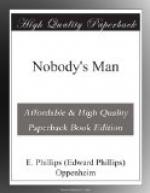There was silence for a time, an unsatisfactory and in some respects an unnatural silence. Tallente trifled with his hors d’oeuvres and was inquisitive about the sauce with which his fish was flavoured. Stella sent away her plate untouched, but drank two glasses of champagne. The light came back to her eyes, she found courage again. After all, she was independent of this man, independent even of his name. She looked across the table at him appraisingly. He was still sufficiently good-looking, lithe of frame and muscular, with features well-cut although a little irregular in outline. Time, however, and anxious work were beginning to leave their marks. His hair was grey at the sides, there were deep lines in his face, he seemed to her fancy to have shrunken a little during the last few years. He had still the languid, high-bred voice which she had always admired so munch, the same coolness of manner and quiet dignity. He was a personable man, but after all he was a failure. His career, so far as she could judge it, was at an end. She was a fool to imagine, even for a moment, that her whole future lay in his keeping.
“Have you any plans?” she asked him presently. “Another constituency?”
He smiled a little wearily. For once he spoke quite naturally.
“The only plan I have formulated at present is to rest for a time,” he admitted.
She drank another glass of champagne and felt almost confident. She told him the small events of the sparsely populated neighbourhood, spoke of the lack of water in the trout stream, the improvement in the golf links, the pheasants which a near-by landowner was turning down. They were comparative newcomers and had seen as yet little of their neighbours.
“I was told,” she concluded, “that the great lady of the neighbourhood was to have called upon me this afternoon. I waited in but she didn’t come.”
“And who is that?” he enquired.
“Lady Jane Partington of Woolhanger—a daughter of the Duke of Barminster. Woolhanger was left to her by an old aunt, and they say that she never leaves the place.”
“An elderly lady?” he asked, merely with an intent of prolonging a harmless subject of conversation.
“On the contrary, quite young,” his wife replied. “She seems to be a sort of bachelor-spinster, who lives out in that lonely place without a chaperon and rules the neighborhood. You ought to make friends with her, Andrew. They say that she is half a Socialist.—By the by, how long are we going to stay down here?”
“We will discuss that presently,” he answered.
The service of dinner came to its appointed end. Tallente drank one glass of port alone. Then he rose, left the room by the French windows, passed along the terrace and looked in at the drawing-room, where Stella was lingering over her coffee.
“Will you walk with me as far as the lookout?” he invited. “Your maid can bring you a cloak if you are likely to be cold.”




